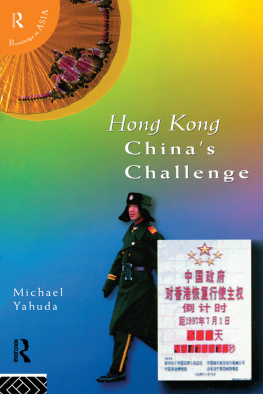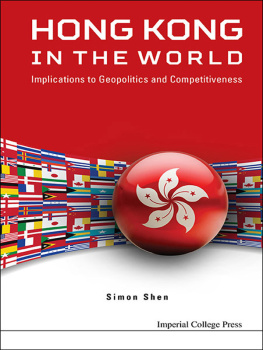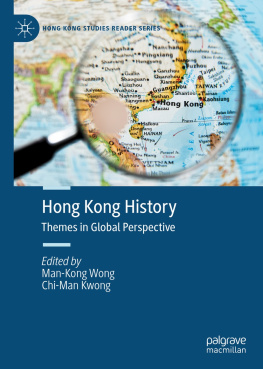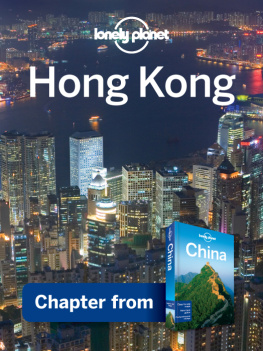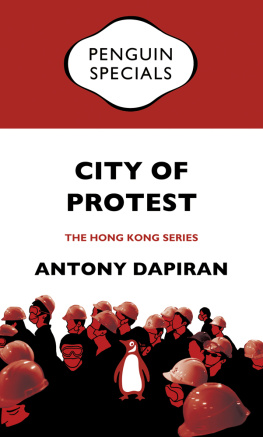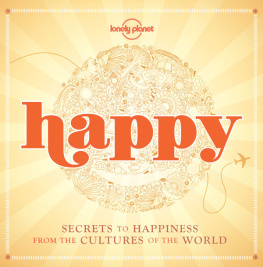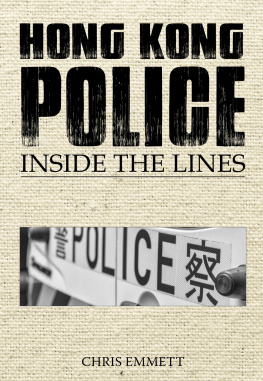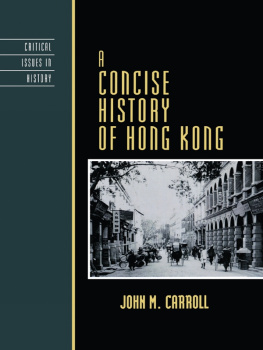Found in Transition
SUNY series in Global Modernity
Arif Dirlik, Ravi Arvind Palat, and Roxann Prazniak, editors
Found in Transition
Hong Kong Studies in the Age of China
Yiu-Wai Chu
Cover image from iStock by Getty Images.
Published by State University of New York Press, Albany
2018 State University of New York
All rights reserved
Printed in the United States of America
No part of this book may be used or reproduced in any manner whatsoever without written permission. No part of this book may be stored in a retrieval system or transmitted in any form or by any means including electronic, electrostatic, magnetic tape, mechanical, photocopying, recording, or otherwise without the prior permission in writing of the publisher.
For information, contact State University of New York Press, Albany, NY
www.sunypress.edu
Library of Congress Cataloging-in-Publication Data
Names: Zhu, Yaowei, 1965 author.
Title: Found in transition : Hong Kong studies in the age of China / Yiu-Wai Chu.
Description: Albany : State University of New York Press, [2018] | Series: SUNY series in global modernity | Includes bibliographical references and index.
Identifiers: LCCN 2017058361 | ISBN 9781438471693 (hardcover : alk. paper) | ISBN 9781438471709 (ebook)
Subjects: LCSH: Social changeChinaHong Kong. | Hong Kong (China)Intellectual life. | Hong Kong (China)History.
Classification: LCC DS796.H75 Z468 2018 | DDC 951.25dc23
LC record available at https://lccn.loc.gov/2017058361
10 9 8 7 6 5 4 3 2 1
Contents
Illustrations
On Translation and Romanization
All translations from Chinese materials are mine unless otherwise stated. For film titles, I have used the corresponding English export titles. Chinese names are generally romanized according to the style commonly used in Hong Kong, with English first names followed by the Chinese surname (e.g., Johnnie To). For the sake of consistency, those without English first names are also romanized in the same way (e.g., Kar-Wai Wong), except those commonly known by pinyin (such as Lin Xi) or internationally known by other formats (such as Tsui Hark). I have adopted the way other Chinese names have been transliterated by convention in Hong Kong, Taiwan, and the Mainland.
Acknowledgments
First and foremost, I cannot express enough gratitude to the late Arif Dirlik for his support and encouragement. I have been profoundly influenced by his work over the years. It is indeed a distinct honor and a special privilege for me to publish my work in his series. To him I am enormously indebted. I would like to offer my special thanks to friends and colleagues who offered constructive comments and/or precious chances for me to present my preliminary views: Rey Chow, Allen Chun, Poshek Fu, Elaine Yee Lin Ho, Andrea Riemenschnitter, Shu-mei Shih, Leo K. Shin, and David Der-wei Wang. Anonymous reviewers of the manuscript and earlier versions of some of the chapters provided me with very valuable advice on how to shape this book. My thanks also go to Danny Weng-kit Chan, my graduate student and friend, for his kind assistance at various stages of this project. Professional support given by Andrew Kenyon of SUNY Press is also greatly appreciated.
Sections of some of the chapters were previously published in the following journals or books: parts of the introduction have appeared in The Last Generation of Local Scholars? (in Chinese), Eva Man ed., Hong Kong Cantonese Culture (Hong Kong: Hong Kong Commercial Press, 2014), 25262; parts of chapter 1 have appeared in Faces of Hong Kong: My City? My Home? International Journal of Cultural Studies 19:3 (2016): 30722; parts of chapter 3 have appeared in Who Speaks for Lion Rock? Pro-Cantonese Campaign (or Lack Thereof) in Hong Kong, Michael Ng and John Wong eds., Civil Unrest and Governance in Hong Kong: Law and Order from Historical and Cultural Perspectives (New York, London: Routledge, 2017), 196212; parts of chapter 4 have appeared in Johnnie Tos Northern Expedition: From Milkyway Image to Drug War, Inter-Asia Cultural Studies 16:2 (June 2015): 192205 and Toward a New Hong Kong Cinema: Beyond Mainland-Hong Kong Co-productions, Journal of Chinese Cinemas 9:2 (June 2015): 11124, both reproduced with permission from Taylor & Francis (www.tandfonline.com); parts of the conclusion have appeared in Introduction, Yiu-Wai Chu ed., Hong Kong Culture and Society in the New Millennium: Hong Kong as Method (Singapore: Springer, 2017), xvixvii; parts of the introduction, chapter 2 and chapter 4 have appeared in Betwixt and Between: Hong Kong Studies Reconsidered, Interventions: International Journal of Postcolonial Studies , published online in June 2018. All of them have been specially revised and/or expanded for this book.
This book was written after I moved to The University of Hong Kong in 2013. I would like to express my appreciation for its generous support of research on Hong Kong Studies, which made the task of writing an enjoyable exercise when Hong Kong is going through a very difficult time. I am also thankful to the Faculty of Arts for providing sabbatical leave, so that I could have the time to focus on this project. Being born, growing up, and living in Hong Kong, I have never felt out of place until lately. In a place where the impact of the rise of China is most intensely felt, I have begun to feel foreign at home. Against such a backdrop, this book is a modest attempt to keep a record of a city haunted by mortality. While I am deeply grateful to the city for being my cherished home for more than half a century, I ungratefully acknowledge those who made it necessary for me to write this book as its record.
As always, I would like to conclude by recording my love for Nancy, Sebastian, Nathaniel, and our family members.
Yiu-Wai Chu
June 2018, Hong Kong
Introduction
Are We Dead Yet?
W hen the prequel of this book Lost in Transition was published in 2013, I did not expect that it would rightly predict the changes that took place in Hong Kong in the following year: I would rather have been wrong. Hong Kong was lost overnight was the tagline on the poster for the movie The Midnight After directed by Fruit Chan, whose Hong Kong trilogy Made in Hong Kong (1997), The Longest Summer (1998), and Little Cheung (1999)was widely acclaimed for presenting remarkable postcolonial Hong Kong imaginaries, and the end of the official trailer offered the following cryptic one-liner: On April 10, give me back my Hong Kong. The allegorical horror movie premiered on April 10, 2014, about one year after Benny Tai, Kin-Man Chan, and Rev. Yiu-Ming Chu released the Occupy Central with Love and Peace (OCLP) manifesto on March 27, 2013. Benny Tai, an Associate Professor of Law at the University of Hong Kong, formally promoted the Occupy Central campaign in January 2013 as a means to strive for genuine universal suffrage, which led to heated controversies in Hong Kong about whether to support it or not. At that point, genuine universal suffrage was seen as the key to taking Hong Kong back. Echoing the theme of the Occupy Wall Street Movement and its offshoots across the globe, the Hong Kong version called on protesters to block roads and paralyze Hong Kongs central business district in response to the chief executive election in 2017, which did not meet international standards in terms of universal suffrage. OCLP was subsequently initiated in March 2013 to ensure that the election of the Chief Executive of Hong Kong in 2017 would take place with genuine universal suffrage. Despite this effort, the decision of the Standing Committee of the National Peoples Congress (NPC) on Issues Relating to the Selection of the Chief Executive of the Hong Kong Special Administrative Region by Universal Suffrage on August 31, 2014, mandated that, among others,


